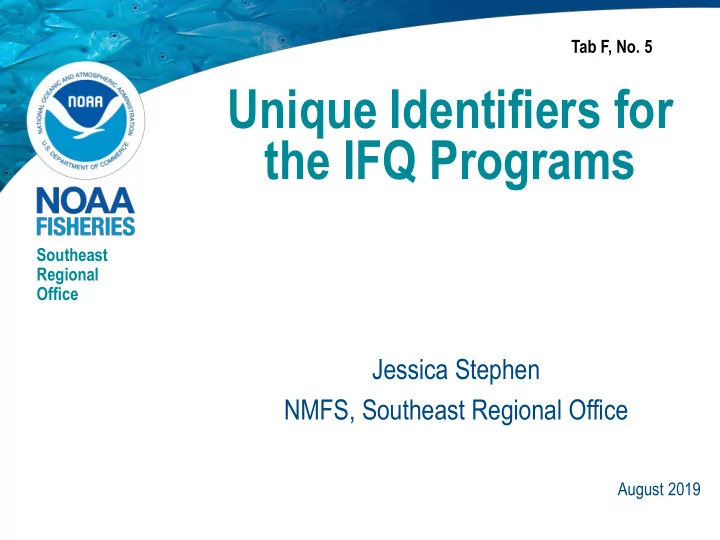

Tab F, No. 5 Unique Identifiers for the IFQ Programs Southeast Regional Office Jessica Stephen NMFS, Southeast Regional Office August 2019
Unique Trip Identifiers & Trip Management Systems • Other regions investigating options (GARFO, NWFSC) • Simple in concept, complicated to enact • Paper data entry • Different systems receive data • Systems may need to modernization to interact ($$) • Ensuring confidentiality • May require change to regulations • Allows formation of comprehensive datasets • May allow for reduced duplicative reporting • Aids in One-Stop Reporting concept U.S. Department of Commerce | National Oceanic and Atmospheric Administration | NOAA Fisheries | Page 2
Components of reef fish data collection Fisherman submits landing Fisherman declares start of notification through Fishing trip through VMS unit or VMS unit, IFQ website, or IFQ VMS call service call service Fisherman submits the Dealer submits trip ticket through Dealer starts IFQ landing paper Coastal Logbook VESL or Trip Ticket application transaction and Fisherman Vessel Trip Report (no weekly – Goes to GSMFC before verifies with PIN before later than 7 days of the SEFSC submission; day of offload end of a trip)
SEFSC Current Data Systems Observers Nationwide Optional Manual input of SERO SEFSC Trip Ticket on IFQ landing TIP IFQ vTrack Database Database (pre-landing (Hail-out; SERO notification; pre-landing Permits Landing notification) transaction) IFQ Line Website SEFSC (PLN) (PLN) VMS Unit Logbook SEFSC Call Line (HO; PLN) Database Manual input of Trip Ticket (Hail-out (vessel trip Logbook number Database Only) report) required on trip ticket (dealer rpts) All data silos typically have one or Paper more of their own unique VESL Logbook ACCSP identifiers per type of action U.S. Department of Commerce | National Oceanic and Atmospheric Administration | NOAA Fisheries | Page 4
Trip Management System (TMS) • Facilitates creation and exchange of a unique trip identifier • Uses logic and eliminates reliance on people IFQ System (4) UTID (4) UTID (1) Hail-out (3) UTID TMS VMS To Pre-landing (2) UTID (4) UTID (4) UTID Logbooks Trip Tickets U.S. Department of Commerce | National Oceanic and Atmospheric Administration | NOAA Fisheries | Page 5
General Challenges to TMS • Not all systems are electronic IFQ System (4) UTID (4) UTID (1) Hail-out (3) UTID TMS VMS To Pre-landing (2) UTID (4) UTID (4) UTID Logbooks Trip Tickets U.S. Department of Commerce | National Oceanic and Atmospheric Administration | NOAA Fisheries | Page 6
General Challenges to TMS • Not all systems are electronic • SERO/SEFSC do not control all data silos • States control trip ticket systems; data passed to SEFSC through GSMFC • VMS database is nationwide • Different reporting time frames and reporters • Not all systems send and/or receive data in real-time • Starting point is variable or not entered • If identifier assigned at hail-out and no hail-out submitted U.S. Department of Commerce | National Oceanic and Atmospheric Administration | NOAA Fisheries | Page 7
Specific to IFQ challenges • VMS related • Not all hail-outs result in a fishing trip • VMS call service hail-outs can be overwritten at next unit signal (unit dependent) • IFQ system • IFQ records transactions not trips • Can have multiple dealers per ‘trip’ • Can have multiple ‘trips’ per landing transaction U.S. Department of Commerce | National Oceanic and Atmospheric Administration | NOAA Fisheries | Page 8
Where are we now? • Trip ticket is an optional field in the landing transaction form (entered by dealer) • Concerns: • Trip ticket format varies by state • Difficult to match to trip ticket datasets later • Timing - trip tickets created after IFQ landing • Solution = IFQ built option to add trip ticket later • Not a mandatory field • No method to record logbook’s vessel trip report number U.S. Department of Commerce | National Oceanic and Atmospheric Administration | NOAA Fisheries | Page 9
Pathways to move forward • Regulatory requirement to enter both logbook vessel trip report number and trip ticket on every landing transaction • Challenges • Trip ticket format differs by state • QA/QC challenge to reduce data entry errors • May have multiple entries per transaction • Create new IFQ database structure, logic, forms • May not be real-time • Time-frames for reporting trip tickets and logbooks differ • Additional staff needed to audit records U.S. Department of Commerce | National Oceanic and Atmospheric Administration | NOAA Fisheries | Page 10
Pathways to move forward • Assign a unique trip identifier after the fact • Challenges • IFQ currently does not record hail-out • New database structure and logic needed • Data depends on fisherman/dealer input • Automation may be limited • IFQ system will need access to other data streams • IFQ system transitioning to new system this year • Additional staff may needed to match records U.S. Department of Commerce | National Oceanic and Atmospheric Administration | NOAA Fisheries | Page 11
Questions U.S. Department of Commerce | National Oceanic and Atmospheric Administration | NOAA Fisheries | Page 12
Recommend
More recommend